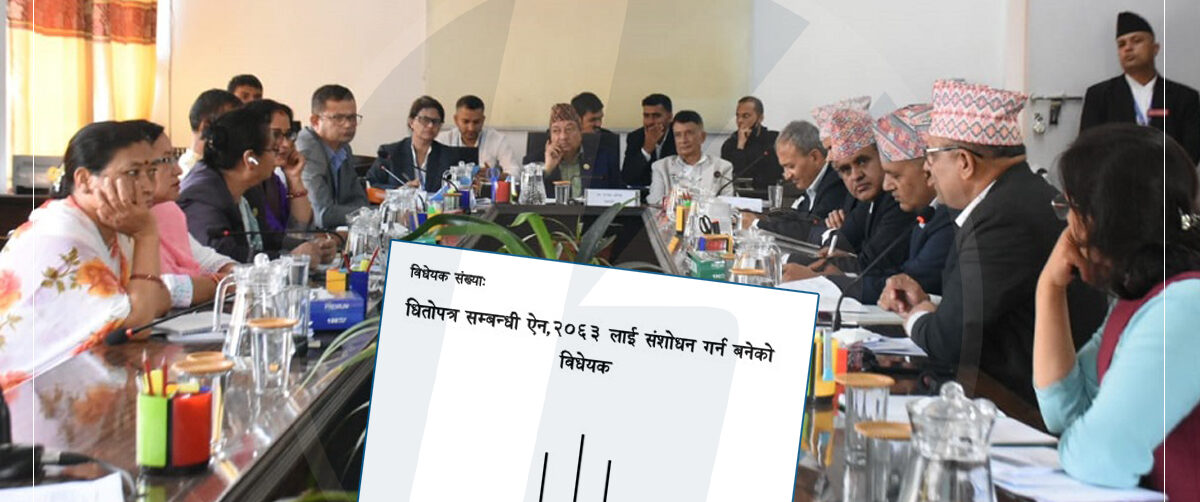KATHMANDU: A total of 28 Members of Parliament (MPs) have proposed amendments to the Securities (First Amendment) Bill, 2081, which is currently under discussion in the Finance Committee of the House of Representatives.
The bill was presented by Finance Minister Bishnu Poudel in the House of Representatives on September 22.
After a general discussion on August 27, the bill was sent to the thematic Finance Committee for a clause-by-clause review.
In the bill presented to the Finance Committee on September 3 and 4 amendment proposals were registered concerning the proposed provisions.
One proposal has been withdrawn, and 28 MPs have submitted 96 amendments across 19 registrations.
The bill includes three amendment proposals, which cover the purpose and reasoning behind the act, theoretical concepts, and the preamble.
In Section 101 of the Act, an amendment has been proposed to impose a ban on securities trading for five years following an infraction, as well as to reduce the fine associated with the violation.
One key proposal suggests amending the act to allow companies with 51% government and 49% citizen share ownership to be listed on the Securities Board, in line with efforts to build a socialist-oriented economy.
This proposal was submitted by MP Prem Suwal. Section 1 of the Securities Amendment Bill outlines the short title and commencement, proposing certification and licensing arrangements for stock market traders within 12 months of the act’s enforcement.
The amendment also stipulates ensuring the source of funds for stock trading.
Seven lawmakers have submitted three amendment proposals, calling for the addition of definitions in Section 2, including terms such as share cornering, pump and dump, and circular trading.
15 amendment proposals in a single section
In the subsection of Section 3, a total of 24 lawmakers have registered 15 amendment proposals.
Among these, there is a proposal to make the inclusion of at least one woman mandatory among the members of the Securities Board.
The bill proposes removing representation from the Federation of Nepalese Chambers of Commerce and Industry (FNCCI) and the Nepal Chartered Accountants Association.
Some lawmakers have filed an amendment to retain these representatives on the board.
Other amendment proposals in this section envision the appointment of an executive vice-chairman and the establishment of liaison offices not only at the provincial level but also at the local level.
An additional amendment proposal suggests including first-class employees of Nepal Rastra Bank, Joint Secretary of the Ministry of Law, and Joint Secretary of the Ministry of Finance as members of the board.
Section 4 of the proposed bill addresses the board’s autonomy and organizational structure.
Two lawmakers have submitted proposals in this regard, including a suggestion to sell 30% of the shares to the public during the initial public offering (IPO) and 19% of the remaining capital to institutions and individuals abroad via the book-building method.
Company qualifications to be added
Two lawmakers have also submitted an amendment to Section 5, concerning the functions, duties, and powers of the board.
This proposal suggests adding the qualifications of office bearers for listed companies and replacing the member of the National Planning Commission in the appointment process for the chairman.
Section 6 of the Act, which covers the meetings and decisions of the board, has one amendment proposal.
This suggests that if the term of the chairman or member is not completed and the post becomes vacant, the chairman or member should be appointed for the full term as per the Act.
In Section 53 of the bill, which relates to the establishment of a compensation fund for the securities market, four lawmakers have submitted three amendment proposals.
These proposals include establishing a designated compensation fund, ensuring investor protection, and prioritizing the fund’s allocation for unemployment allowances, health, and education for the children of workers and farmers.
Chapter-4A, added by Finance Minister Poudel, pertains to the operation of the Central Depository Service.
Eight lawmakers have proposed six amendments, which include provisions such as preventing the merger of such an institution with others for 10 years, setting the renewal deadline for the fiscal year, and prohibiting large businessmen from engaging in trading.
Additionally, an amendment has been proposed to Section 61 to reduce the renewal period for securities traders.
One lawmaker has suggested retaining the current provision, which mandates renewal within three months of the fiscal year’s end, rather than requiring it before the fiscal year concludes, as proposed in the bill.
Proposal to remove compensation fund and deposit service
Two MPs have registered amendment proposals to remove the Investor Compensation Fund and the Central Depository Service.
Additionally, an amendment has been proposed to allow brokers to appoint authorized representatives and extend the audit time by 20 days.
In Section 17, which deals with the delegation of authority, four lawmakers have proposed that authority should only be delegated to officers of the special category within the board.
In Section 101 of the Act, an amendment has been proposed to impose a ban on securities trading for five years following an infraction, as well as to reduce the fine associated with the violation.
Three MPs have submitted two proposals to remove the trustee provision included in the bill, while three others have suggested adding work experience requirements through two separate amendments.
Amendment proposals on unaddressed matters
MPs have also proposed amendments on matters not originally included in the bill.
Four MPs have registered two proposals requesting that the functions, duties, and powers of the board, as outlined in Section 5, be incorporated into the capital market curriculum.
They also called for new investors to be provided with sufficient information, for the preparation and monitoring of a list of individuals with conflicts of interest, and for an end to proprietary trading by banks.
Five amendment proposals have been submitted to Section 7 of the main Act, which pertains to the appointment of the chairman of the board.
These proposals suggest that the Public Service Commission should form a committee, under the coordination of a former chairman or member, to conduct a written examination.
The proposals also call for the appointment of a new chairman before the current chairman’s term ends and the introduction of a vice-chairman position.
Vacancy and committee provisions
Section 14 of the main Act, which addresses the filling of vacant positions, has three amendment proposals from 10 lawmakers.
These proposals suggest that if the post of chairman becomes vacant, the government should appoint a new chairman and fill the position within three months.
Four lawmakers have proposed an amendment to Section 16, which allows for the formation of committees or sub-committees.
Two lawmakers have also proposed amendments to shorten the settlement period for transactions and reduce risks associated with the use of technology.
Their amendment would require that when forming a committee, at least one first-class officer be present, that the duties and powers of the committee be prescribed by the board, and that a report be prepared and submitted to the board meeting.
Delegation of authority and family relationships
In Section 17, which deals with the delegation of authority, four lawmakers have proposed that authority should only be delegated to officers of the special category within the board.
Three lawmakers have registered two amendment proposals requesting that maternal uncles and maternal aunts be included in the definition of family relationships.
Six lawmakers have also filed a proposal stating that all types of income, transactions, and fees of the authority should be exempted.
Securities market and stock exchange provisions
Section 36 of the Act empowers the board to operate the securities market. Four lawmakers have proposed an amendment requiring the process to proceed only after obtaining government approval.
Additionally, there is a proposal to limit the issuance of licenses to a maximum of three new stock exchanges.
The bill sets a minimum capital requirement of Rs 50 million for companies entering the secondary market.
Two lawmakers have submitted an amendment proposal to increase the minimum capital to Rs 3 billion, require sufficient financial resources, and allow companies two years to reach the Rs 3 billion threshold.
Securities trading and transaction settlement
Eleven lawmakers have submitted three amendment proposals to replace “securities brokerage” with “securities trading.”
Two lawmakers have also proposed amendments to shorten the settlement period for transactions and reduce risks associated with the use of technology.









Comment